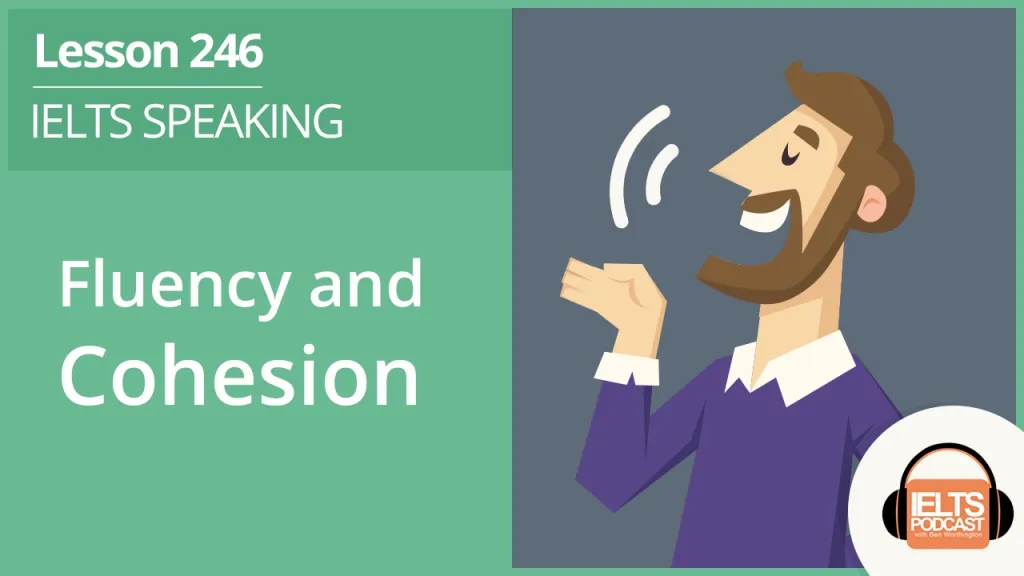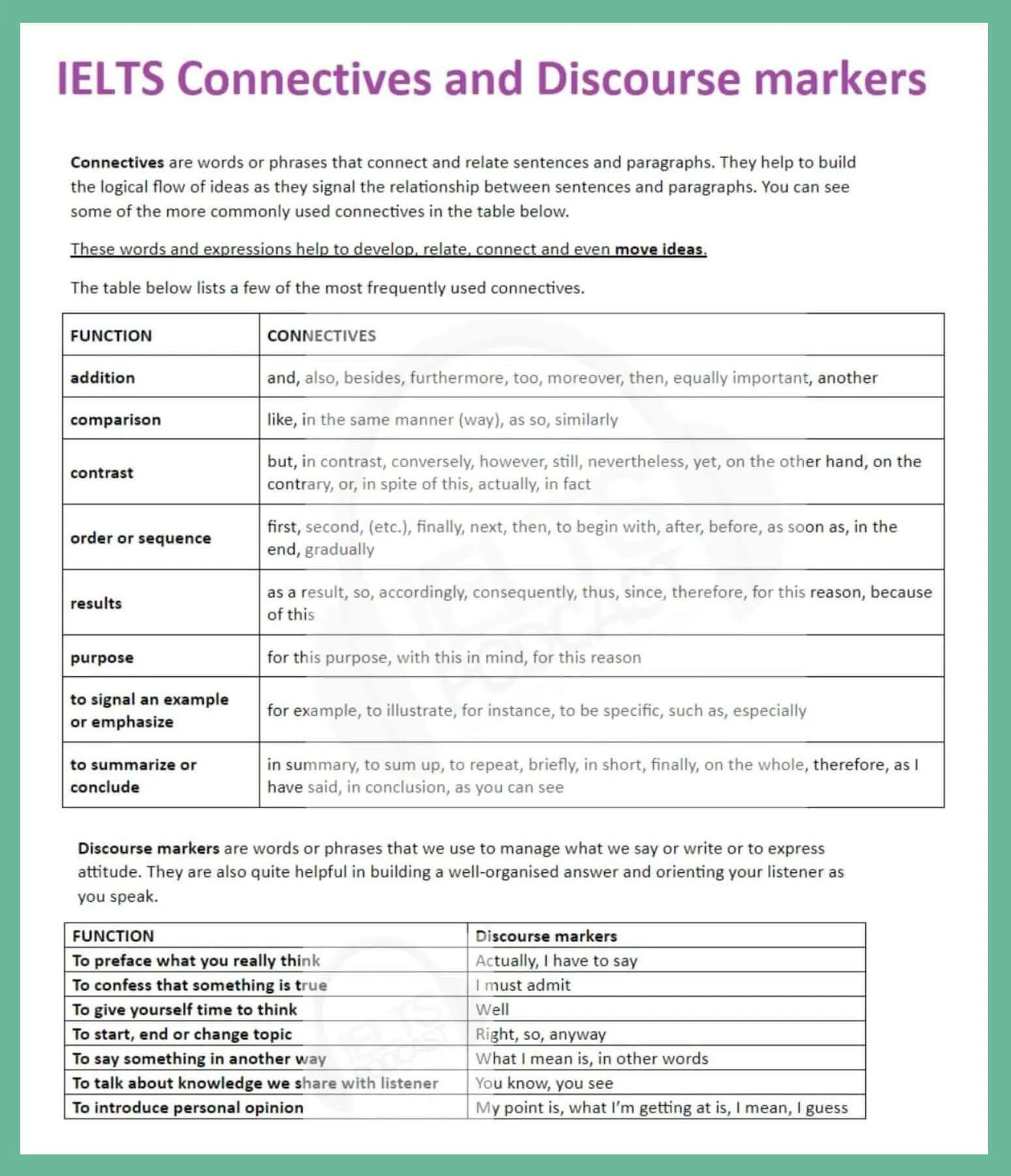
IELTS speaking: fluency and cohesion
Home » IELTS speaking » IELTS speaking: fluency and cohesion
Using connectives and discourse markers
In this tutorial, you will learn how to use connectives and discourse markers effectively to attain band 7 in the fluency and cohesion criteria.
This will help you in your IELTS speaking exam because:
- You will learn what connectives and discourse markers are and what is flexibility in their use
- You will see examples of how they can be used successfully to improve your answer for Band 7
The criteria of fluency and cohesion for band 7 indicates that the candidate should use a range of connectives and discourse markers with some flexibility. Let’s discuss what are discourse markers and connectives, what is to use them with flexibility and how to achieve that flexibility in your exam answer.
In order to sound convincing and confident your speech needs to be both connected and logical.
This can be achieved in speech by using a number of special words and phrases called connectives or linkers.
Very often they are also called discourse markers, though some sources still specify that discourse markers’ function is to actually show the listener that we are going to show attitude, introduce opinion, rephrase, repeat or change what we are saying. Anyway, both groups of these words help to make what we say clearer for the listener and add order and structure to your answer.
Connectives are words or phrases that connect and relate sentences and paragraphs. They help to build the logical flow of ideas as they signal the relationship between sentences and paragraphs. You can see some of the more commonly used connectives in the table below.
These words and expressions help to develop, relate, connect and even move ideas.
The table below lists a few of the most frequently used connectives.
| FUNCTION | CONNECTIVES |
| addition | and, also, besides, furthermore, too, moreover, then, equally important, another |
| comparison | like, in the same manner (way), as so, similarly |
| contrast | but, in contrast, conversely, however, still, nevertheless, yet, on the other hand, on the contrary, or, in spite of this, actually, in fact |
| order or sequence | first, second, (etc.), finally, next, then, to begin with, after, before, as soon as, in the end, gradually |
| results | as a result, so, accordingly, consequently, thus, since, therefore, for this reason, because of this |
| purpose | for this purpose, with this in mind, for this reason |
| to signal an example or emphasize | for example, to illustrate, for instance, to be specific, such as, especially |
| to summarize or conclude | in summary, to sum up, to repeat, briefly, in short, finally, on the whole, therefore, as I have said, in conclusion, as you can see |
Discourse markers are words or phrases that we use to manage what we say or write or to express attitude. They are also quite helpful in building a well-organised answer and orienting your listener as you speak.
| FUNCTION | Discourse markers |
| To preface what you really think | Actually, I have to say |
| To confess that something is true | I must admit |
| To give yourself time to think | Well |
| To start, end or change topic | Right, so, anyway |
| To say something in another way | What I mean is, in other words |
| To talk about knowledge we share with listener | You know, you see |
| To introduce personal opinion | My point is, what I’m getting at is, I mean, I guess |

A piece of advice for those who want to attain a band 7 answer would be to use a good variety of both connectives and discourse markers, to avoid repeating them and not to use only the basic ones (like and, or, but, however, in my opinion). This is exactly what the exam criteria of using them “with flexibility” refers to.
Now let’s have a look at the good answer and the function of each connective in context.
QS: Why do people want to learn a foreign language?
Well [to give yourself time to think], that’s because [reason] it’s very useful in modern society. I guess [personal opinion], language learning stopped being a hobby and turned into a trend. That [reference] is due to [reason] many real advantages in employment, relationships and health.
First [order], speaking more than one language can open up a great number of employment opportunities for job seekers, especially [emphasis] if [condition] that language is widely used in business. So, if [condition] you speak a language like English or Mandarin, you will be able to work for not only local but [contrast] global businesses too [add ideas], with the additional advantage of a very decent salary.
Second [order], if [condition]you speak two or more languages, this [reference] will help you to extend your connections worldwide. So [result] you will be able to build lasting friendships with foreign co-workers or local people when [time] you travel around the world.
And finally [order], your brain will benefit a lot from such a [example] learning activity as discovering a new language. Research showed that studying another language helps prevent brain illness and keeps you more mentally fit as well as [add ideas] improves your memory. In short, [conclude] what I’m getting at is that [personal opinion] learning a foreign language is more than beneficial!
As you can see, this answer indeed shows a flexible use of connectives and discourse markers. They are not repeated (except several uses of if, which is justified) and all used appropriately.
All the ideas are organised well and the connections between them are clear and logical. Thus, using appropriate connectives will make your exam answer ordered and intelligible, and will show that you are flexible when using them and can use a certain range to express yourself in an orderly and logical manner.
Well, that’s because it’s very useful in modern society. I guess, language learning stopped being a hobby and turned into a trend. That is due to many real advantages in employment, relationships and health.
First, speaking more than one language can open up a great number of employment opportunities for job seekers, especially if that language is widely used in business. So, if you speak a language like English or Mandarin, you will be able to work for not only local but global businesses too, with the additional advantage of a very decent salary.
Second, if you speak two or more languages, this will help you to extend your connections worldwide. So you will be able to build lasting friendships with foreign co-workers or local people when you travel around the world.
And finally, your brain will benefit a lot from such a learning activity as discovering a new language. Research showed that studying another language helps prevent brain illness and keeps you more mentally fit as well as improves your memory. In short, what I’m getting at is that learning a foreign language is more than beneficial!
184 words
Audio tutorial
You can download or listen to the audio version here:
|Direct Download Here | Stitcher | iTunes | Spotify | Soundcloud | Transcript |
